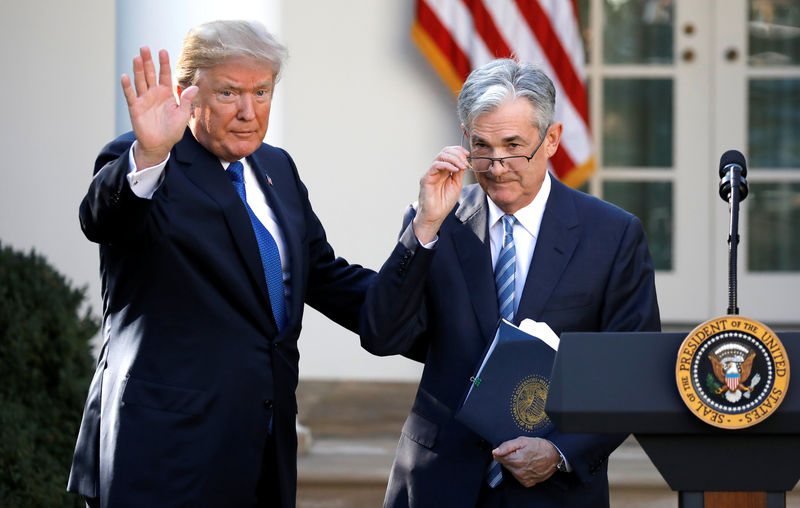LONDON (Reuters) - Following are five big themes likely to dominate thinking of investors and traders in the coming week and the Reuters stories related to them.
1/POWELL TO THE PEOPLE
The U.S. Senate Banking Committee holds a hearing on Tuesday to confirm the nomination of Jerome Powell to succeed Janet Yellen at the helm of the Federal Reserve. If, as expected, Powell is confirmed, he faces tough challenges.
The world's top economy is pretty much firing on all cylinders, enjoying record long expansion, the lowest unemployment in nearly half a century and with Wall Street at historic highs.
But wages and inflation are rising slower than the Fed would like, household debt is high and the expansion is closer to its end than the beginning. Those concerns are highlighted by the Treasury yield curve which is at the flattest in a decade.
Whatever the reasons behind the remarkable pace of curve flattening in recent weeks, the fact remains that the 2s/10s yield curve is only 58 basis points from inverting - the classic signal that recession is just around the corner.
U.S. yield curve - http://reut.rs/2zTuIoy
2/ HERE WE GO AGAIN (IN EUROPE)
For about six weeks, European government bonds enjoyed one of their most benign periods this year. The ECB had extended its asset purchases, economic growth was improving and the axis of German Chancellor Angela Merkel and French President Emmanuel Macron was seen leading Europe into the next generation of reforms.
Now cracks are starting to appear.
Germany's Merkel is struggling to form a coalition, raising the possibility of snap elections. The Irish government is on the verge of collapse, driving government bonds lower. The development could send ripples through the euro zone "periphery" and may also affect Britain's divorce with the EU.
And Italian elections loom in the first half of 2018. All this is a reminder that political risk in Europe isn't quite over.
Irish bonds sell off as government on the brink - http://reut.rs/2AtpS23
3/REGULATOR IN THE CHINA SHOP
Chinese stocks suffered their biggest fall in 18 months on Thursday. Faced with low visibility on authorities' deleveraging plan - considered the main reason behind the rout - investors are wondering how long and deep the reversal could be.
Mainland stocks have gained 24 percent in 2017 (CSI300). Since government bond yields started climbing two months ago, they are up 6.5 percent. But they lag the 34 percent year-to-date jump across emerging stocks. (MSCIEF)
Banking stocks have outperformed even though the first crackdown by authorities since October Party Congress has been on the shadow banking sector and micro-lenders, removing a big source of retail funding for stock market investments.
Meanwhile business surveys due on Wednesday will provide clues on the health of the world's second largest economy. Late buying supports China stocks after worst day in months Chinese firms scrap plans for micro loan business amid crackdown on 'blind borrowing'
China's markets tumble on deleveraging worries - http://reut.rs/2A15eWw
4/CUTS BOTH WAYS
Oil producers assembling in Vienna on Nov. 30 are expected to extend supply cuts to support crude prices - but Russia may throw a spanner in the works.
Although not a member of the Organization of the Petroleum Exporting Countries (OPEC), Moscow agreed with the group and nine other producers to curb output by about 1.8 million barrels per day until March 2018.
Saudi Arabia wants a nine-month extension of this deal. But Russia has sent mixed signals about whether it will back the move.
Oil producers fighting for market share drove Brent crude futures (LCOc1) to a trough of $27 a barrel in January 2016. Curbing supplies since then has helped oil rise to over $60 a barrel, but the recovery has also resuscitated U.S. shale production to a record 9.66 million barrels per day.
Saudis push for nine-month extension of OPEC-led oil cut Russia sends mixed signals about oil output deal before OPEC meets U.S. oil prices rise to two-year high on pipeline outage
Brent crude futures vs US weekly oil production - http://reut.rs/2A57TOQ
5/WILL THEY SHOP UNTIL THEY DROP?
With Black Friday - the busiest day of the year for U.S. retailers - kicking off the holiday shopping season, markets are trying to gauge what's in store for the sector.
Of the 218 retailers tracked by Thomson Reuters, the internet sector is expected to see fourth quarter earnings expand at the fastest clip - 13.8 percent. Six of the 10 retailers in the sector are anticipated to see higher earnings than a year ago, with Netflix (NASDAQ:NFLX)'s earning per share (EPS) predicted to soar 176.7 percent.
Amazon (NASDAQ:AMZN) is also set to see a 19.4 percent earnings jump.
But it doesn't look rosy for everyone. The textiles, apparel and luxury goods sector is expected to see earnings shrink 8 percent. Ten of the 22 retailers in this group are likely to see earnings fall year-on-year.
The Thomson Reuters Same Store Sales Index predicts 1.6 percent growth in the fourth quarter. While that increase is twice as big as last year's, it is below the 3-percent healthy mark. Consumer spending accounts for over two-thirds of U.S. economic activity and increased at a 2.4 percent annualised rate in the third quarter.

Earnings Growth Estimates For Q4 2017 - http://reut.rs/2A2z78T